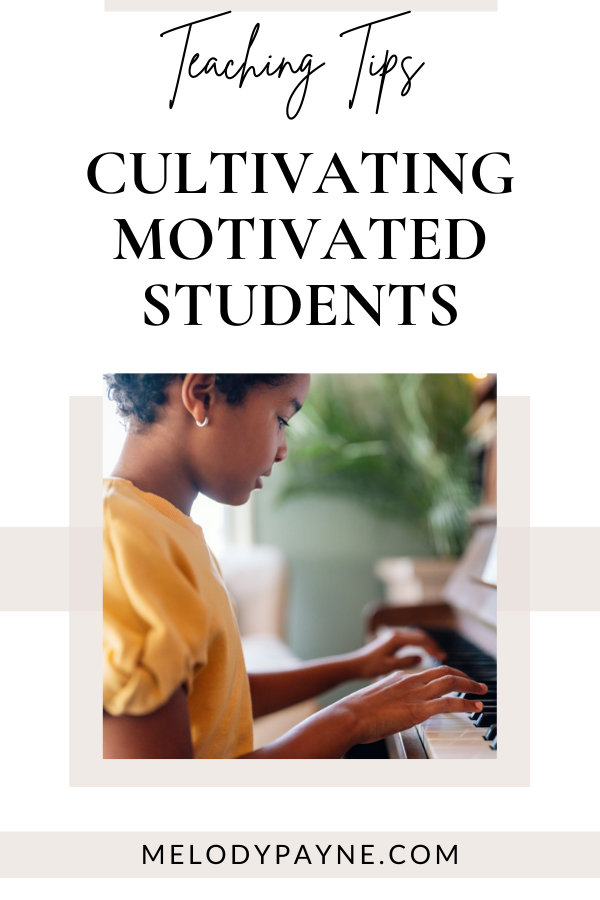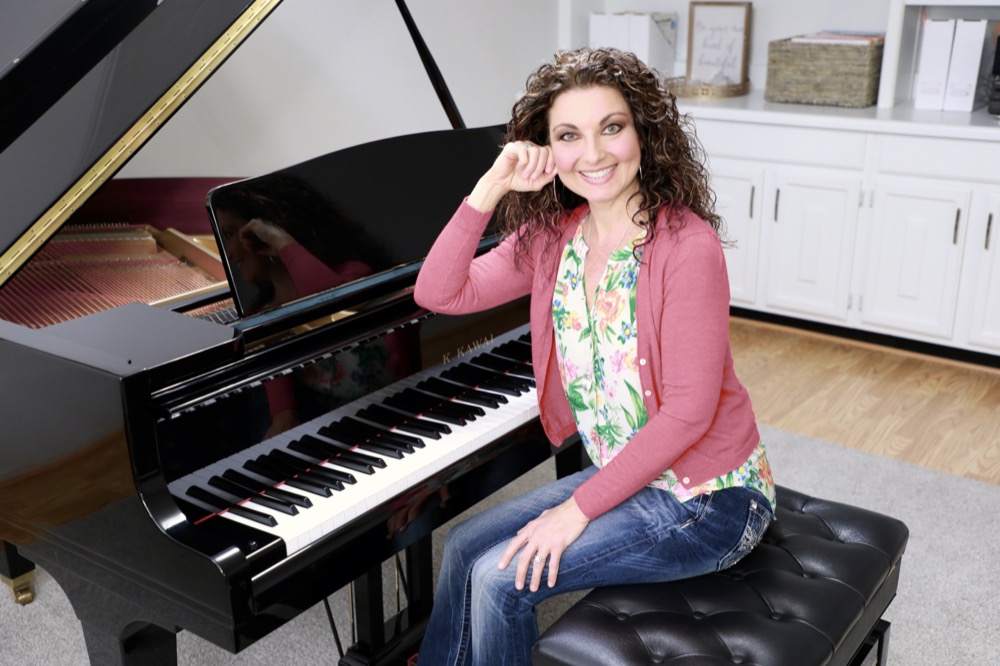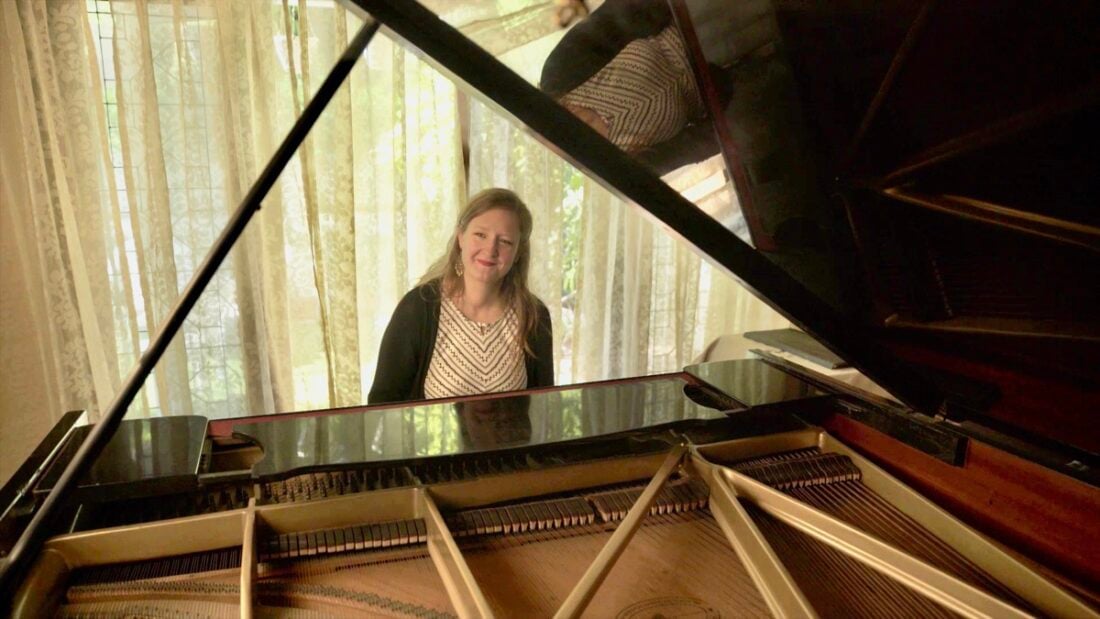Cultivating Motivated Students in the Piano Studio
This post may contain affiliate links. If you purchase something through an affiliate link, I will receive a small commission at no cost to you. For more information, read the disclosure statement here.
For this article on cultivating motivated students in the piano studio, I am pleased to introduce the guest author, Melanie Hardage. Melanie is a pianist, composer, and teaching artist experienced in contemporary piano, Western classical, and South Asian fusion. She draws on diverse musical experiences including her Western classical training, collaborations with other musicians, and engagement with art to create her unique fusion style. Melanie and I went to college together and I’m so happy to have her share her knowledge and experience with you. Please enjoy Melanie’s article on cultivating motivated piano students.

Cultivating Motivated Students
How to motivate students—the age-old dilemma.
It’s wonderful to have internally motivated students. They come to lessons prepared and enthusiastically soak up every morsel of teacher wisdom you can offer.
But what about the other students? The ones with little to no weekly progress and an ambivalence that can make you want to stand on your head just to get their attention.
Or what about a student who started strong but fell into a rut and now seems disinterested?
How can we motivate our students to want to practice piano, study, and persevere in piano studies so they obtain a lifetime of enjoyment?
Student-Driven Learning
It may seem obvious, but a great starting point is to find out why they come to our studios in the first place.
In my early years of teaching, I assumed every person who approached me for lessons wanted to learn as I had learned the piano. That is, using a conventional method book series and progressing toward Western classical music.
I will never forget one particular student who trudged through lessons with eyes glazed over until one day I asked if he would like to try coming up with his own melody. His eyes lit up. “That’s why I asked my parents for you to teach me,” he blurted out. “I want to make my own songs!” (if this type of comment would send you into a panic, check out Easy Composition Activity for Beginning Piano Students)
Oof. I missed the most glaring motivating factor by not taking a thorough inventory in the beginning and asking the most basic question: what do you want to learn how to do?
Once I realized my error, I was able to support his desires by incorporating segments in the lessons for learning how to read chord charts, notation, and sharing his music (read our article How to Use the AnyTune Pro App in Piano Lessons if you want to help your students play with chord charts).
He went on to write and perform an original composition for piano, cello, and violin at 17, and is now a graduate music student.
The point is not that I am great at teaching composition (I’m not!). Rather, once we know our students’ reasons for wanting to learn the piano, we can craft a plan that includes steps to fulfill those dreams so they are motivated to continue while in the mundane part of the process.
Fixed vs. Growth Mindset
Psychologist and researcher Carol Dweck theorized that there are contrasting mindsets responsible for success (or lack thereof).
On one end, a fixed mindset believes that skills, abilities, and potential are innate from birth. On the other end, a growth mindset believes that skills, abilities, and potential can be improved upon with work and effort.
Can you guess which mindset is proven to motivate? Hint: it isn’t the one that says “I can’t.”
Learning to spot fixed mindset thinking is important so we can take steps to model and demystify whatever skill, ability, or potential they believe they “just don’t have.” When there is a genre I’m not familiar with, I tell my students and try to learn along with them so they understand I wasn’t born with every skill I have either.
When they say they can’t do something we break down the steps of how to get there. When they say “I could never play like ___” I figure out what aspect they are referring to and deconstruct that skill or technique to a level they can see is obtainable with practice.
But the most effective psychological tool I use with my students is to simply remind them when they achieve things they said they couldn’t. This is a powerful motivator to keep going (and a great antidote to fixed mindset thinking!). This is being the eyes and ears for our students when they have forgotten all they have accomplished.
Fostering Independence
Fostering independence is paramount in cultivating motivated students. I dislike the notion of a student’s inability to learn a piece without me. A huge part of our work is teaching how to practice—teaching how to learn. Automating this process motivates students to work independently and enthusiastically.
I adopted these ideas after having my children. One child, you can manage. Two children and you are ok if you have a partner helping. But once you cross over into the crazy land of three children, there’s more of them than you and you cannot manage everything for everyone (I have five, by the way).
Out of necessity, I began to teach my kids how to do certain tasks on their own in order to make things run more smoothly in the home. Curiously, this gave my children ownership in the task and made them excited about being old enough to learn how to do…a chore.
I will never forget when my then 10 year old son presented a packing list for summer camp asking if he could pack everything himself. My first reaction was to say no. He was only 10 after all! But I resisted and said go for it.
He had the checklist. He had what he needed, and he knew what to do. He packed everything for an entire week in a small backpack and I never looked inside (horrors!). This was a great lesson for him and me about trusting the young people in our care and letting them take ownership of their own progress, goals, and success.
When my son returned from camp, he told me about his friend Eddie whose mother had packed two giant suitcases for him. Eddie couldn’t carry everything by himself and was embarrassed by the excess. He didn’t care about those suitcases or what was inside and never even opened one of them the entire week.
This demonstrates that if we want our students to make use of the skills we teach them, we have to give them opportunities for ownership in the process.
We can motivate them by giving clear, modeled instruction and continually putting the ball back in their court for every single aspect of their learning.
We must be patient whilst waiting for our students to connect the dots between their goals and their direct involvement in the success or failure of those goals.
For many, it takes a long time before they internalize the growth mindset and put into regular practice the strategies we’ve taught them for success to become self-motivated students.
The importance of asking questions during this phase cannot be overstated. Sample questions to foster independence:
- What do you hope to accomplish by learning this piece?
- How will you feel once you’ve completed this and what will you do with it?
- How will you get from point A to point B this week?
- How did you feel about your practice efforts last week?
- Why do you think you were unsuccessful at reaching your goals?
- Do you know what to do to reach your goals (for this week, month, year)?
Student-Driven Goals and Self-Assessment
At every lesson, I have students list a goal (feasible within their skill level) and a reach goal (above and beyond what they could achieve with basic practice).
In general, I do not set goals for my students. I guide them. I highlight problems and how to correct them. However, I find that passing the baton back to students lets them figure out how and when they will reach their goals.
Similarly, creating opportunities for self-assessment motivates them to persist and learn to accurately analyze their progress.
Sample questions for self-assessment:
- How would you rank this performance and why?
- What do you feel you did well?
- What needs improvement?
- Are you ready to move on or do you wish to take this to the next level?
I have been astounded by what students could accomplish when they took ownership of their goal setting and assessment.
It can feel scary, but when we eliminate the pressure of controlling everything and move toward a collaborative learning process, the stress and negativity surrounding unmotivated students disappears—on both sides! We are then able to facilitate with joy as we support our students through their own unique music journey.
Other posts to help you have motivated students
Don't miss out!
Follow on Facebook and Instagram, join the best Facebook group for piano teachers, and subscribe to the newsletter to get helpful teaching tips, resources, and tutorials delivered straight to your inbox every week.
Melanie Hardage
Melanie Hardage
Welcome!

Hi! I’m Melody Payne, a pianist and piano teacher, educational resource author, a fun-loving wife to the most wonderful and talented hubby I could ask for, and a lifelong learner who loves to share. I want to make your life as a music teacher easier by writing and sharing helpful and relevant music teaching articles, and by creating educational resources with your very own students in mind. If you are a parent who wants to enroll your child in piano lessons, I’d love for us to get started building those skills that can give your child a lifetime of musical enjoyment!


